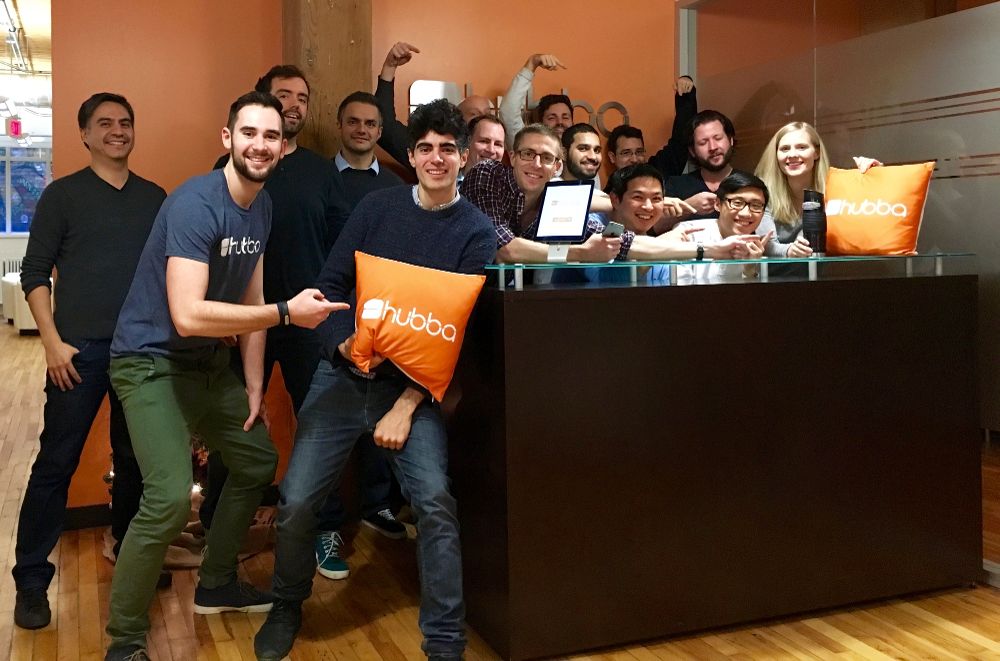Just over ten years after its founding, Toronto-based retail startup Hubba will shut down operations, BetaKit has learned.
A communication confirming the decision to wind down the company was sent to investors Monday. An unconfirmed number of Hubba employees were also laid off Monday as part of the decision (LinkedIn lists 45 current employees, with the majority located in Canada).
Hubba had courted several notable investors, including Goldman Sachs, Kensington Venture Fund, Real Ventures, and Brightspark Ventures, among others.
When reached earlier via email, Hubba CEO and founder Ben Zifkin declined to comment.
A software company dedicated to helping independent retailers and emerging brands connect to buyers, Hubba had courted several notable investors, including Goldman Sachs, Kensington Venture Fund, Real Ventures, and Brightspark Ventures, among others (BetaKit has reached out to multiple firms for comment). Per CrunchBase, the company had raised over $60 million in venture capital to date.
Hubba was also notable for an experienced leadership team with time at BlackBerry, Wattpad, Mozilla, GMP Securities, and Workbrain, where Zifkin was an early employee prior to its acquisition in 2007.
The pedigree of Hubba’s investors and executive team was also in-line with the company’s bold proclamations regarding its future.
“It’s the opposite of a lean startup — this isn’t like ‘let’s build a speedboat, put more horsepower on it, and get more and more,’” Zifkin told BetaKit following the company’s Series B round in 2016. “We’re going to build a fucking supertanker, and it’s going to take a little bit longer, but once we get out of the harbour, it will be unstoppable.”
The CEO had also been quite public at the time about his intentions to surpass a $1 billion unicorn valuation, with eyes towards a potential IPO as early as 2020.

Considered for most of the decade one of Toronto’s hottest startups, Hubba hit choppy waves in 2018, as the company lost its chief technology officer and chief marketing officer in an three-month span, in addition to two rounds of layoffs which saw headcount reduced by almost half.
The company at the time was also in the midst of a pivot away from enterprise to independent retail. In its early days, Hubba offered a platform for brands, distributors, and vendors to manage product information, and a discovery network allowing ‘craft’ brands to get on the radar of larger retailers (Hubba counted PetSmart, Walmart, Unilever, and AB InBev as clients). From 2018 onward, the company focused entirely on independent brands, matchmaking them with retail distribution and allowing buyers to order directly through Hubba.
“Hubba brought together a group of people who not only cared about the product that they were building, but the community they were a part of. You’re going to see that impact for years.”
“We started seeing this world of independent retail, and our brands didn’t want to necessarily get into Walmart,” Zifkin said at the time.
It is unclear to what extent the COVID-19 pandemic had hampered Hubba’s growth and customer base. However, one source BetaKit spoke with claimed a months-long battle between Zifkin and Hubba’s board of directors regarding the ongoing viability of the company. Recent StatCan data indicates that over half of Canadian businesses (98 percent of which are small businesses) saw a drop in revenue compared to 2019, with 20 percent seeing a revenue drop of 40 percent or more.
Questions of legacy are difficult for companies that have existed nearly the lifespan of the ecosystem they sprouted from. If Zifkin once famously said that “Toronto does not have a start-up problem, we have a finish-up problem,” it was an honest assessment from a local ecosystem booster who would also claim that Toronto was sitting on 25 potential unicorns.
“Ben Zifkin is one-of-a-kind,” Aran Hamilton, CEO of Toronto startup Vantage, told BetaKit. “Not only one of the biggest thinkers, I think he’s also the most selfless and generous person in the Toronto emerging tech community. I can’t count the number of times he’s called or texted me words of advice and encouragement, or invited me to come present our company to new audiences.”
Hubba was also a company known for a variety of efforts to foster the development of the tech ecosystem and direct its impact towards noteworthy causes, including pilot coding programs for local women’s shelters, events promoting increased LGBTQA+ representation, tools to track diversity within tech organizations, and equity commitments for charity.
Former Hubba CPO (and longtime BetaKit contributor), Johnathan Nightingale, confirmed that such initiatives were part of the company’s DNA when told of its demise.
“They were building a startup, but so many of those people were trying to have a positive impact on the world in a dozen different ways,” Nightingale said. “Hubba brought together a group of people who not only cared about the product that they were building, but the community they were a part of. You’re going to see that impact for years.”

